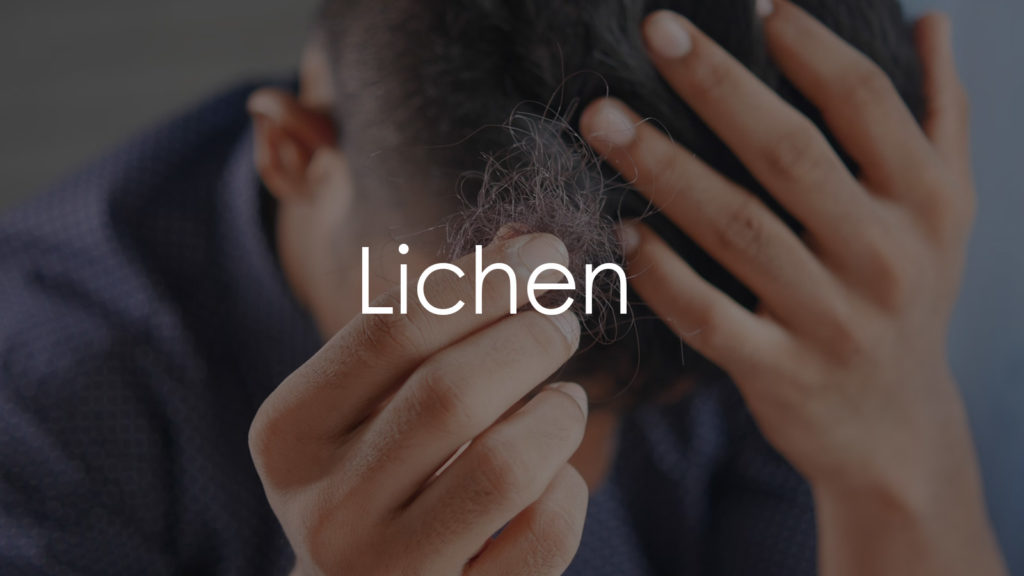Lichen planus, a condition characterized by itchy, flat-topped, purple or reddish lesions, has multifactorial causes. While the exact cause remains unclear, a combination of genetic, immunological, and environmental factors is believed to play a role in its development.

Genetic Predisposition
Genetics can significantly influence the likelihood of developing lichen planus.
Family History
A family history of lichen planus or other autoimmune disorders can increase the risk.
- Genetic Link: Studies suggest a genetic predisposition to lichen planus, as it often runs in families.
- HLA Associations: Specific human leukocyte antigen (HLA) subtypes have been linked to an increased susceptibility to lichen planus.
Genetic Mutations
Certain genetic mutations can affect the immune response, leading to conditions like lichen planus.
- Immune System Genes: Mutations in genes that regulate immune function may predispose individuals to autoimmune reactions.
- Inherited Traits: Traits inherited from parents can impact the body’s response to triggers that cause lichen planus.
Immune System Involvement
Lichen planus is widely recognized as an autoimmune condition, where the immune system mistakenly attacks healthy cells.
Autoimmune Reaction
The immune system’s abnormal response plays a crucial role in lichen planus.
- T-Cell Mediated Response: Cytotoxic T-cells target and destroy the body’s own skin cells, leading to the characteristic lesions of lichen planus.
- Chronic Inflammation: Persistent immune activity causes chronic inflammation and damage to the affected tissues.
Cytokine Imbalance
An imbalance in cytokines, the signaling proteins of the immune system, can contribute to lichen planus.
- Pro-inflammatory Cytokines: Elevated levels of pro-inflammatory cytokines can exacerbate the immune response.
- Cytokine Profiles: Specific cytokine profiles are associated with the severity and progression of lichen planus.
Environmental Triggers
Environmental factors can trigger or exacerbate lichen planus in genetically predisposed individuals.
Viral Infections
Certain viral infections are linked to the onset of lichen planus.
- Hepatitis C Virus (HCV): A strong association exists between lichen planus and chronic hepatitis C infection.
- Other Viral Triggers: Viruses such as human papillomavirus (HPV) and Epstein-Barr virus (EBV) may also trigger lichen planus.
Drug-Induced Lichen Planus
Medications can induce lichen planus-like reactions, known as drug-induced lichen planus.
- Common Medications: Drugs such as beta-blockers, nonsteroidal anti-inflammatory drugs (NSAIDs), and certain antimalarials are known triggers.
- Mechanism: These medications may alter immune responses or directly affect skin cells, leading to lichen planus.
Allergens and Irritants
Exposure to allergens and irritants can provoke or worsen lichen planus.
- Contact Allergens: Substances such as metals, dyes, and chemicals can cause allergic reactions that trigger lichen planus.
- Oral Irritants: Dental materials, certain foods, and oral hygiene products can irritate the mucous membranes and lead to oral lichen planus.
Associated Conditions
Lichen planus can be associated with other systemic conditions and diseases.
Autoimmune Diseases
Lichen planus is often seen in conjunction with other autoimmune diseases.
- Rheumatoid Arthritis: Patients with rheumatoid arthritis have a higher incidence of lichen planus.
- Systemic Lupus Erythematosus (SLE): There is an observed link between lichen planus and lupus.
Metabolic and Endocrine Disorders
Metabolic and endocrine disorders can also be related to the development of lichen planus.
- Diabetes Mellitus: A higher prevalence of lichen planus is noted in diabetic patients.
- Thyroid Disorders: Conditions such as hypothyroidism and hyperthyroidism are associated with an increased risk of lichen planus.
Psychological and Stress Factors
Stress and psychological factors can influence the onset and progression of lichen planus.
Emotional Stress
Emotional stress is a known trigger for lichen planus flare-ups.
- Stress Response: Stress can weaken the immune system, making the body more susceptible to autoimmune reactions.
- Cortisol Levels: Elevated cortisol levels due to stress can exacerbate inflammatory conditions, including lichen planus.
Psychological Conditions
Mental health disorders can correlate with the prevalence of lichen planus.
- Depression and Anxiety: Higher rates of lichen planus are observed in individuals with depression and anxiety.
- Psychosomatic Influence: Psychological stress can manifest physically, contributing to skin conditions like lichen planus.
Hormonal Influences
Hormonal changes and imbalances can affect the development and severity of lichen planus.
Hormonal Fluctuations
Changes in hormone levels, particularly in women, can trigger lichen planus.
- Menopause: The onset of menopause and the associated hormonal shifts can exacerbate lichen planus.
- Pregnancy: Hormonal changes during pregnancy can influence the course of the disease.
Endocrine Disorders
Disorders of the endocrine system can impact the development of lichen planus.
- Adrenal Insufficiency: Conditions affecting the adrenal glands and hormone production can contribute to lichen planus.
- Pituitary Disorders: Imbalances in pituitary hormones can also be a factor.
Conclusion
The causes of lichen planus are multifactorial, involving a complex interplay of genetic predisposition, immune system dysfunction, environmental triggers, associated conditions, and psychological factors. Understanding these causes is crucial for developing effective management strategies and improving the quality of life for those affected by this chronic condition. By staying informed and working closely with healthcare providers, individuals can better navigate the challenges of lichen planus and manage its symptoms effectively.